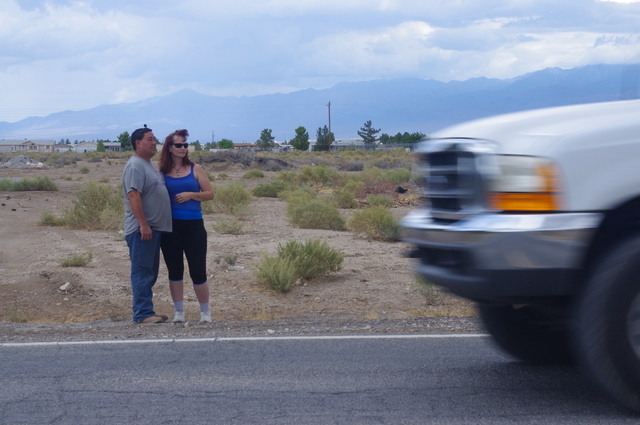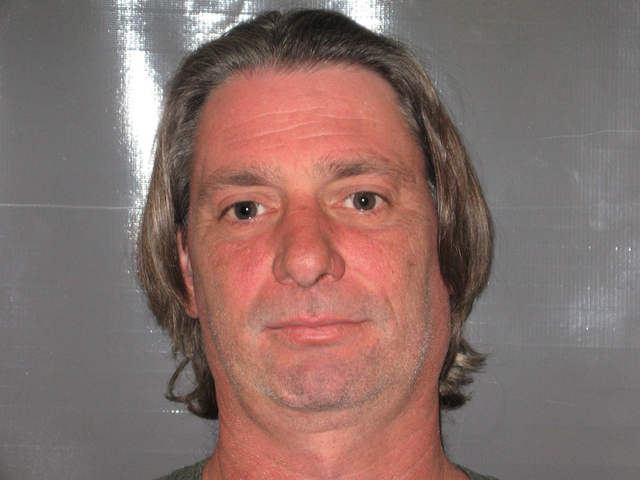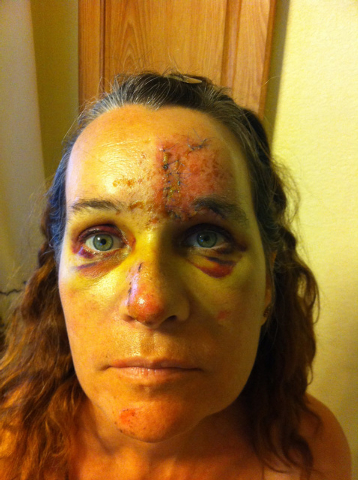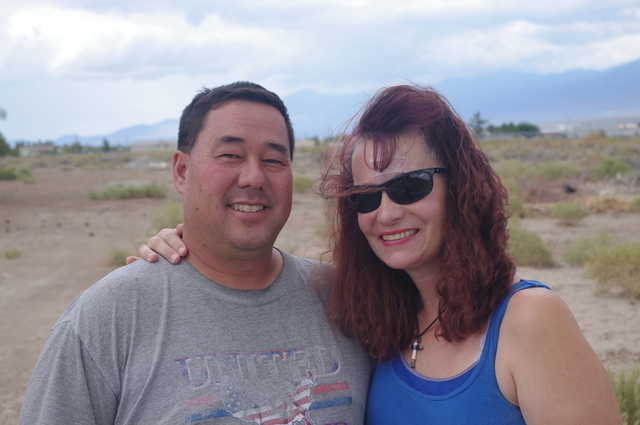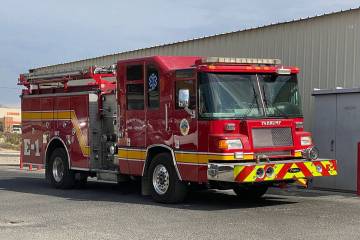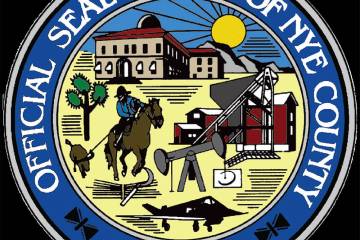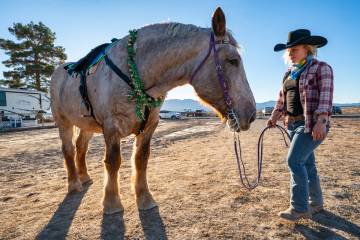ALIVE TO TELL THE TALE: Man sentenced to 15 years for gruesome 2012 DUI wreck
It sends chills down her spine every time she thinks about it.
It’s a fleeting thought, but one that strikes with surprising regularity.
It mostly happens when she thinks back to that horrific day, Sept. 19, 2012.
She does that a lot — when her back suddenly aches, when she applies the silicon gel on the still-healing scar on her face, when her daughter has another panic attack, or when another hefty medical bill lands in her mailbox, adding to the growing pile.
Was he watching her that night?
Did he see what he’d done?
Did he peer out of his own kitchen window, across an empty splash of desert and see the cop cars and ambulances, the frantic, screaming daughter, the husband who wept as he cradled his critically-injured wife’s head in his arms?
Theresa Whitt shudders at the thought.
She swears he must have. How could he not have? He certainly knew what he’d done.
He almost killed her.
Scarier still, his recklessness could have killed her then-21-year-old child, too.
Terrance McCloskey lived just about a block and a half away, in a yellow A-frame home on Casey Road. It’s where he fled when he sped away from where he left Whitt’s body, crumpled and bloody along the gravel shoulder on nearby Manse Road.
That’s where cops found him — thanks to an anonymous tip — still drunk from one too many late afternoon cocktails. It was a Wednesday.
That’s where they also found his white truck with the yellow stripe, passenger side headlight broken, the mirror on that side of his dually smashed in, shards of glass collecting on the older truck’s floor board.
He denied everything at first. But after allowing police into his garage, he quickly grew sullen, resigned.
“I deserve to be in handcuffs,” he broke down, his words slurred.
He spent the next 72 hours in jail, charged with DUI, failure to report an accident and failure to render aid. He got rid of the truck to make his $9,500 bail.
Whitt, who has raised seven children, was just beginning the slow recovery process when the careless McCloskey walked out of jail after earning his seventh serious traffic infraction, and at least his fifth DUI since 1997. He had earned his fourth just three months prior; a minor was riding shotgun when that one happened.
Part of Whitt’s long road to recovery ended Friday when a Fifth Judicial District Court judge sentenced McCloskey to 15 years in state prison and ordered him to pay $74,607 restitution.
The sentence was long in coming. The judge noted the miracle it was that McCloskey had not killed anyone yet.
“This has just been a terrible tragedy that has spiraled so far out of control. The only thing that I ask for is that — I know what I did wrong — the only thing I ask for is that the sentencing be fair and just. And I hope through this sentencing that Ms. Whitt can find some closure and some peace,” was all McCloskey shared when given the chance.
Judge Kimberly Wanker refused — twice, at two hearings on June 20 and then again Friday — McCloskey’s public defenders, who asked for leniency, including probation and then a later request for only three years in the slammer.
“I cannot condone your actions. What’s so troubling to me is after you hit her, you might have panicked, but you left her on the road for dead. Had her daughter not been there, she would have died,” Wanker told the defendant.
Whitt, having waited patiently for her day in court, finally confronted McCloskey during the June 20 hearing — a disagreement over restitution had delayed McCloskey’s sentencing.
“Before the accident, I had a natural faith in the goodness of people. I no longer have that. I’ve lost that faith in people. I don’t believe people are good anymore. I don’t feel safe anymore. I don’t know if I will ever feel safe walking through a parking lot anymore, or in the desert on the side of the road, which is how I got hit. My safety and security has been taken away from me,” the radiology student and grandmother testified.
Whitt relayed how she was an avid exercise enthusiast before the accident, walking close to the same route every day for about eight years. She gets a bit nervous when she describes how she heard McCloskey’s truck approach from behind. Turning, she caught only a glimpse of the vehicle before its bumper crashed into her hip, twisting her body into the air. Once airborne, the truck’s oversized mirror caught her forehead, cracking it open. Mangled, her body landed about 15 feet from where she was initially hit. The back of her head split open, too, after a rough landing. Her nose was broken and so was one of her legs.
She and daughter, Leah Mackley, were walking a good six to eight feet from the road’s surface when McCloskey, aptly called a “roving menace” by one prosecutor, swerved off the road and hit her. Whitt wrestles with a feeling she was struck on purpose, as if for sport.
McCloskey screeched his truck to a halt after hitting Whitt. Leah says he looked back, hesitated for a few seconds, gunned the engine, and burned away.
“It’s a miracle he didn’t kill somebody until me. It makes you wonder, you know. It makes me wonder if he actually hit somebody before me and just ran,” she said.
Eerily, a man named Michael Flennory, 35, was killed only nine months before while bicycling in the same area, along Pahrump Valley Boulevard. He was struck and killed near Casey Road where McCloskey lived. It was a hit and run, too. And no one has ever been charged.
“So many people have died while walking or riding along the roads in Pahrump. Some of the killers were never found and their victims will never have justice,” Whitt said while reading a statement in court June 20 and referring to Flennory. “I am disturbed by the lack of value on human life. I will never be able to walk on these roads again.”
Her injuries aren’t the only painful aspects of this experience. Whitt says the hit to her finances and credit from all the medical bills might be the most angering part of all.
“That made me really, really angry. It really did. I’ve taken a lot of pride in that (having perfect credit) over the years,” she said.
Husband Michael Chow says he is angry, too, not just for what could have happened to his wife, but because McCloskey evidently decided to divest and hide assets right after the accident in an effort to skirt paying damages.
Chow, a former Realtor, says while McCloskey was still in jail, he checked the man’s property records and discovered he owned a $79,000 home free and clear. After his release, however, McCloskey took out a $37,000 loan and then let the home go into foreclosure. It was auctioned, renovated and now belongs to a man from Utah who purchased the home about six weeks ago.
Chow questions how McCloskey even received a taxpayer funded public defender with such an asset to his name.
“Where is the $37,000? We should have access to that,” Chow said.
Whitt is suing McCloskey in civil court, but shrugs when asked if she believes she’ll get anything. Luckily, as an Air Force veteran many of Whitt’s bills were covered. Still, the constant pain in her back requires weekly trips to the chiropractor.
The pain may last as long as McCloskey is in prison. The thought that he sped away, fled to his home where he watched her almost die, that won’t go away.
Fleeting as it is, Whitt fears she’ll always think about that, a life sentence.


